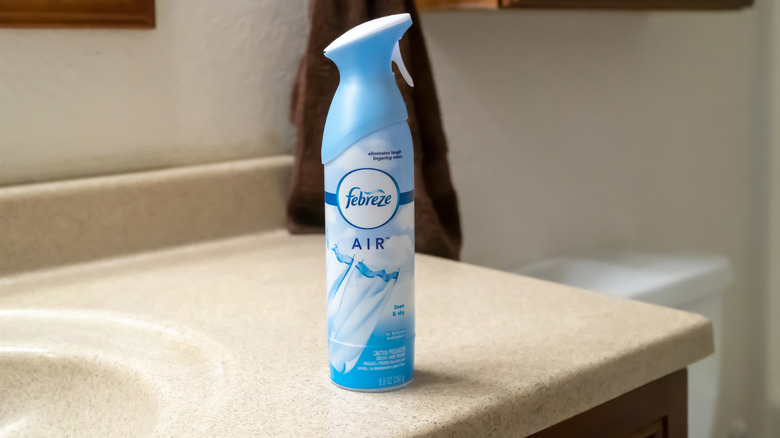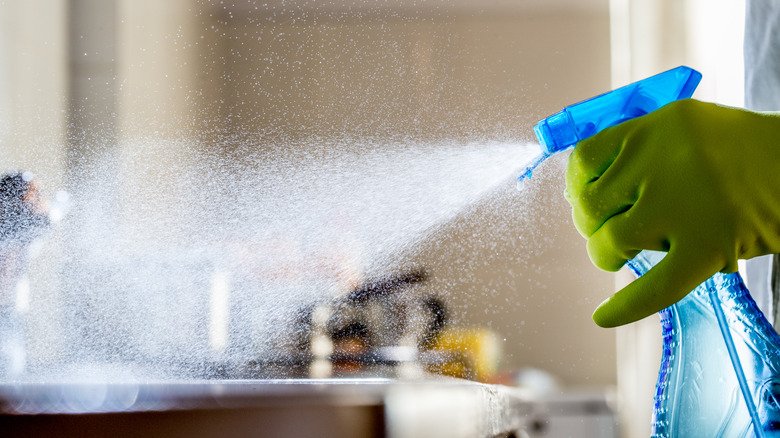Is Febreze Really The Secret To A Spider-Less Home?
Finding spiders wandering about your home and spinning their webs in corners is never a pleasant experience. We quickly look around for a shoe — or some other adequate weapon — to swiftly squash them and bring their journey through our home to an end. But did you know that an everyday household staple can be your new go-to spider killer? Febreze is known for making our spaces smell their best on a whim, but it can also be effective in killing spiders should you encounter one.
Febreze is clearly not marketed as a pesticide, but certain ingredients used in the product bring it up to the task. Since not all components of the air freshener are targeted toward terminating eight-legged insects, it won't be as effective as more mainstream pesticides like Raid or Hot Shot — and spraying it in the air alone won't stop the pests from entering. However, it can still be a great on-hand approach that won't require you to squash the bugs and will leave a more gratifying smell in its wake.
How Febreze eliminates spiders
Febreze's power to fend off spiders is not about the air freshener itself but rather about some select ingredients used within it. Febreze contains a number of elements that will be deadly to spiders should they come into contact with them. It is no surprise to find ethanol in our Febreze, as it is in everything, from beverages to medicines to cosmetics. In an air freshener, it helps distribute the fragrance and dissolves quickly, but for spiders, it acts as a poison. Ethyl Acetate is another quick-to-evaporate substance found in Febreze and is effective in suffocating spiders and other insects. This solvent is also commonly used in pesticides.
Limonene is another chemical that is used in pesticides and is also part of Febreze's recipe. Limonene aids in providing a citrusy scent to our air fresheners and is helpful in the suffocation of spiders. The Hydoxpropyl Beta-cyclodextrin used in Febreze doesn't have a particularly fatal effect on arachnids, but it produces a repugnant odor the insect can't stand, even though our noses have no such qualms. While many of these components can be found in products specifically tailored to eliminate pests, they don't always smell great to us, and you can buy three cans of Febreze for the price of one can of Raid. Febreze isn't a perfect deterrent, and you may need to use a lot to wield results, but it's still an effective and convenient approach.
Similar remedies
Alongside our trusty Febreze, many items that can kill or repel spiders are likely already in your pantry at home. Similarly to Febreze, Windex is known to be fatal to arachnids when coming in direct contact. It'll take more product than a pesticide for results, but it'll do the job on impulse. Another commonly used item is white vinegar, which has acetic acid that scorches spiders. Lemon juice has a similar effect due to the fruit's high acidity. Mix these products in a spray bottle with water and use as needed.
Repellants are more common to find sitting around your home than lethal products; hopefully, these will result in you never even having to lay eyes on the insect. Soaking garlic cloves and onion in water creates a natural repellant for spiders, the smell keeping them far away from areas where this is applied. Like with vinegar and lemon, you can put this into a spray bottle and apply it to corners, window sills, cabinets and cupboards, and other openings that spiders might take advantage of. Many oils have the same effect and can be added to water to distribute around the home. Peppermint, eucalyptus, rose, tea tree, cinnamon, and cedar oil will all work to repel spiders with their aromas. These on-hand and at-home solutions may not have the same detrimental and fast-acting effect that store-bought pesticides will, but they make a difference, have pleasant smells, and are affordable alternatives.


